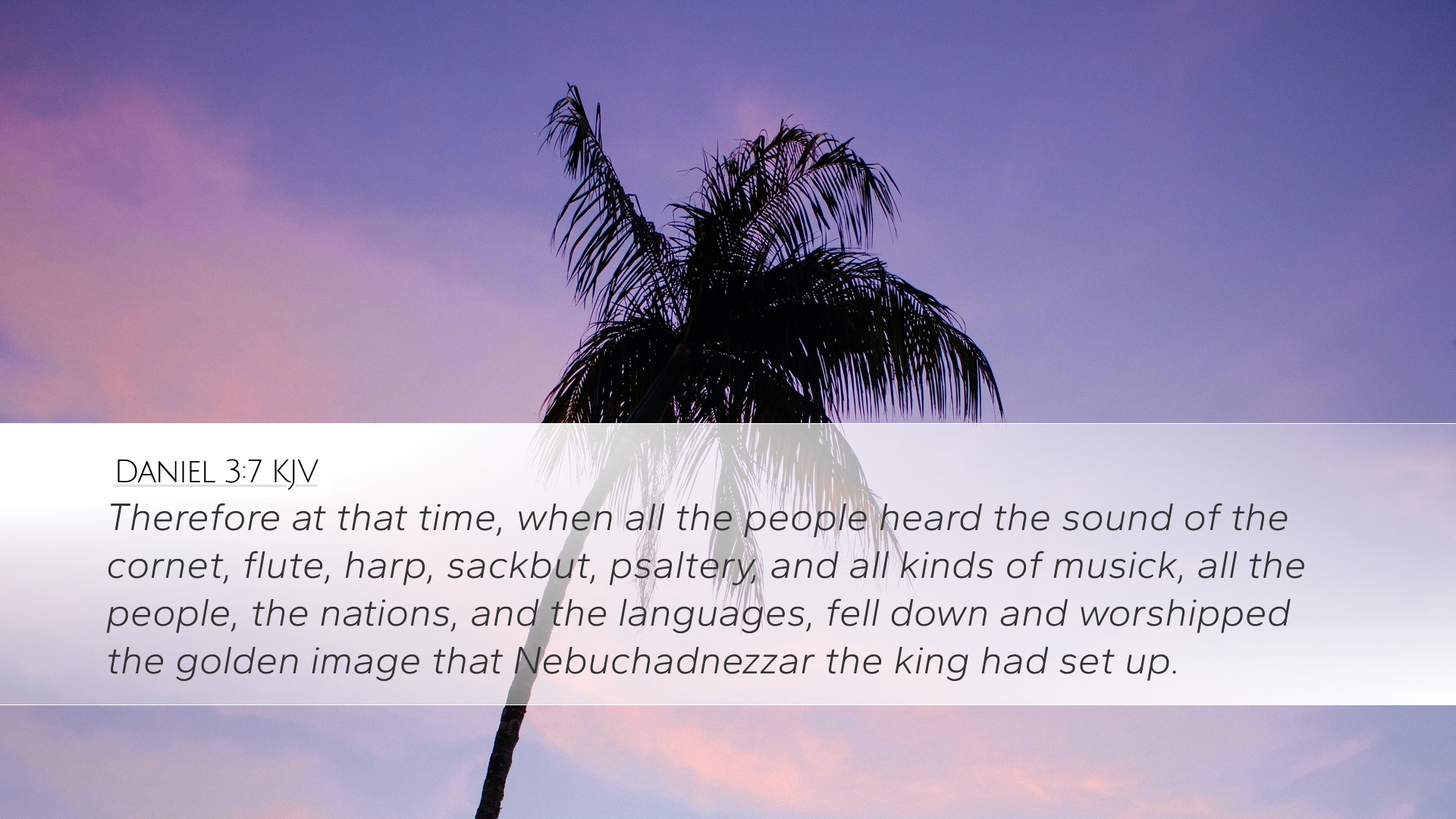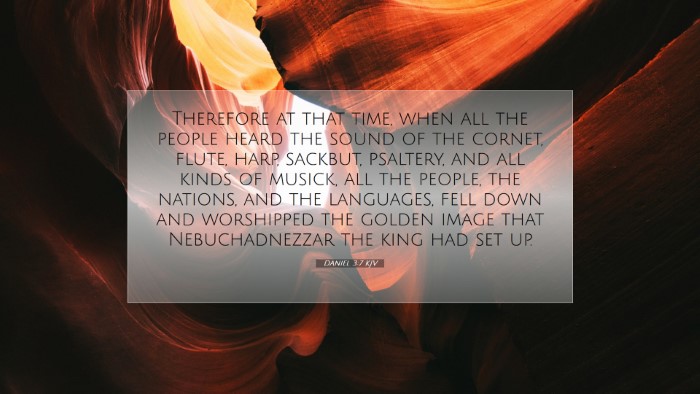Commentary on Daniel 3:7
Daniel 3:7 states: "Therefore at that time when all the people heard the sound of the cornet, flute, harp, sackbut, psaltery, and all kinds of music, all the people, the nations, and the languages, fell down and worshipped the golden image that Nebuchadnezzar the king had set up."
Introduction
Daniel 3:7 captures a pivotal moment in the narrative of the Babylonian captivity, illustrating the tension between faithfulness to God and the pressures of culture and authority. In this verse, we witness the immediate reaction of the populace to Nebuchadnezzar's decree, highlighting themes of idolatry, societal pressure, and the consequences of leadership.
Historical Context
At this point in the Book of Daniel, King Nebuchadnezzar has established a golden image, demanding worship from all the people in his empire. This act is not merely a proclamation of his power, but also a reflection of the Babylonian culture that often prioritized state over personal faith. Several commentaries provide insight into this setting:
- Matthew Henry: emphasizes that Nebuchadnezzar’s command mirrors the sinful nature of humanity’s desire to create idols. He notes that the music played was representative of the world’s tools used to appeal to the masses, enticing them to worship.
- Albert Barnes: points out that such a decree showcases the conflict between divine authority and earthly governance. His commentary underscores that the king’s demands were in direct opposition to the Hebrew faith.
- Adam Clarke: highlights the significance of the variety of instruments used, suggesting that the grandeur of the musical presentation aimed to stir emotions and compel compliance among the people.
The Nature of the Command
The king's decree represents a challenge to the worship of the true God, forcing a stark decision for those who profess faith.
- Matthew Henry: notes that the scene is fraught with tension, suggesting that worship amid coercion poses a significant dilemma for the faithful.
- Albert Barnes: elaborates that the demand was absolute, encompassing "all the people, nations, and languages," highlighting the universal nature of the pressure to conform.
Responses to the Royal Edict
The immediate response of the people to the music signifies both collective conformity and the power of cultural influence. Such reactions are notable in biblical texts regarding idolatry:
- Matthew Henry: describes the concerted effort of the people to fall before the image as indicative of their fear and desire for self-preservation.
- Albert Barnes: emphasizes that the act of worship was not motivated by genuine belief but rather by intimidation and obligation.
- Adam Clarke: draws attention to the implications of public worship, noting that individuals often find themselves caught in the fray of societal expectations.
Implications for Faith and Practice
The scenario in Daniel 3:7 invites modern readers to assess their responses to societal pressures. It raises urgent theological questions about faithfulness in a culture that often mandates compromise:
- Commitment to God: The actions of the followers of God in the following verses indicate a steadfastness that acts as a counter narrative to the compliance shown by the masses.
- Adherence to Conviction: How do we, as believers, respond to cultural pressures that demand idolatry? This question is crucial for both pastors and laypeople as they navigate contemporary issues.
Theological Reflections
In analyzing this verse, we reflect on several key theological points:
- The Sovereignty of God: Despite Nebuchadnezzar’s apparent power, ultimately, God is sovereign. Nebuchadnezzar’s reliance on external symbols of power (like the golden image) starkly contrasts with the enduring, unseen power of God.
- The Nature of Worship: True worship involves reverence and is not a matter of physical posture alone. Worship is an expression of the heart, and the coercion evident in this passage challenges our perceptions of sincerity in worship.
- The Cost of Discipleship: For Christians, the call to follow Christ often requires standing firm against societal norms, paralleling the challenges faced by the young Hebrew men in the upcoming narrative of Daniel 3.
Conclusion
Daniel 3:7 serves as a profound reminder of the pressures faced by believers in uncertain times. The combined insights from the commentaries of Matthew Henry, Albert Barnes, and Adam Clarke elucidate the complexities of faith under duress and the ongoing relevance of this episode in the life of the church today. The appeal to conform in the face of a cultural edict urges contemporary believers to remain steadfast, faithful, and unwavering in their commitment to God, irrespective of the circumstances surrounding them.


